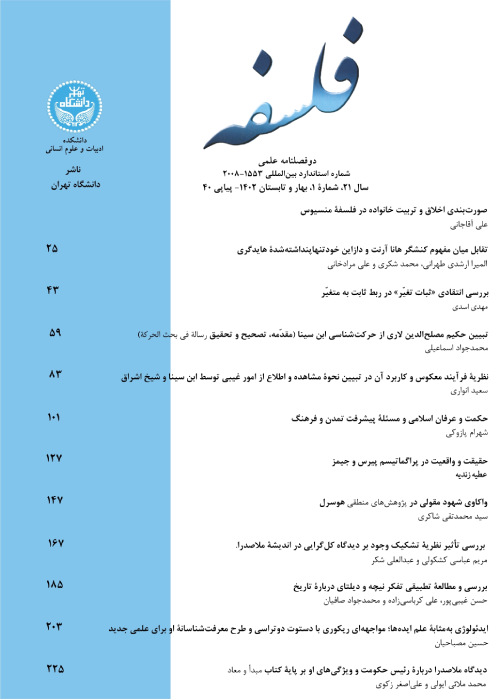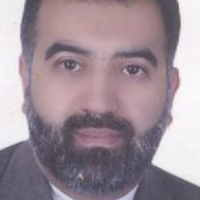Formulation of Ethics and Family Education in the Philosophy of Mencius
Author(s):
Article Type:
Research/Original Article (دارای رتبه معتبر)
Abstract:
Based on the theoretical framework of the paradigm, in response to the question of what are the foundations and approaches of ethics and family education in the philosophy of ancient China and Mencius in particular, it proposes the hypothesis that Mencius in the Confucian intellectual system, but with the innovation of the paradigm (model) and in the light of it, he has had a more spiritual approach in the analysis of ethics and upbringing, moral rules, the network of the moral system and the virtues of the family system. He has a stronger and more transparent metaphysical approach and a great emphasis on human goodness, which is very frequent and effective in educational and moral issues. From his point of view, the relationship between husband and wife is the beginning of all human relationships and has a major contribution to the peace of society. According to Mencius, harmony between husband and wife, kind treatment of children, division of labor and continuation of service to parents after death are important aspects of family. The behavior of the government in such a way that people can easily form a family; The relationship between kindness to the child and his conscientiousness and order in the country; Determining domestic affairs by the wife and business affairs by the husband; strict father and kind mother; not publicizing parents' mistakes; and graded love and affection with family priority; The findings of the research. Mencius is an ethical philosopher who thinks within the Confucian tradition; But in ontology, it has a more and more transparent metaphysical approach; Therefore, he clearly ties ethics and education and its foundations, especially in the family, with the sky and makes it relatively spiritual, then links it with the field of politics. According to Mencius, nature is the source of ethics and all ethics are intertwined in nature. In anthropology, he places great emphasis on human goodness and believes that the sense of distinguishing between right and wrong is common to all human beings. According to his point of view, the goodness of nature is internal and is not imposed from outside, and it arises from the active and spontaneous power of nature, and the neglect of goodness is due to forgetfulness and lack of thinking. According to Mencius, the four virtues of piety, wisdom, knowledge, and benevolence are among the virtues that family upbringing and ethics play an essential role in creating and nurturing. In philosophy, Mencius believes in the continuity of the individual, family and government and sees a linear relationship between them. He believes that the root of the country is in the family and the root of the family is in the individual. Layered or dubious love and affection, which has different degrees and ranks, and love for family, relatives, and relatives is at the center of it, is the focal point that passionately motivated him to criticize the competing views of the Confucian school and outline his theoretical foundations; An effort that is based on two foundations: 1. Negation of speculation and action for oneself or piety for its inherent goodness; and 2. The innateness and naturalness of love is stable. (results).
Keywords:
Language:
Persian
Published:
Philosophy, Volume:51 Issue: 1, 2023
Pages:
1 to 23
magiran.com/p2701768
دانلود و مطالعه متن این مقاله با یکی از روشهای زیر امکان پذیر است:
اشتراک شخصی
با عضویت و پرداخت آنلاین حق اشتراک یکساله به مبلغ 1,390,000ريال میتوانید 70 عنوان مطلب دانلود کنید!
اشتراک سازمانی
به کتابخانه دانشگاه یا محل کار خود پیشنهاد کنید تا اشتراک سازمانی این پایگاه را برای دسترسی نامحدود همه کاربران به متن مطالب تهیه نمایند!
توجه!
- حق عضویت دریافتی صرف حمایت از نشریات عضو و نگهداری، تکمیل و توسعه مگیران میشود.
- پرداخت حق اشتراک و دانلود مقالات اجازه بازنشر آن در سایر رسانههای چاپی و دیجیتال را به کاربر نمیدهد.
In order to view content subscription is required
Personal subscription
Subscribe magiran.com for 70 € euros via PayPal and download 70 articles during a year.
Organization subscription
Please contact us to subscribe your university or library for unlimited access!



